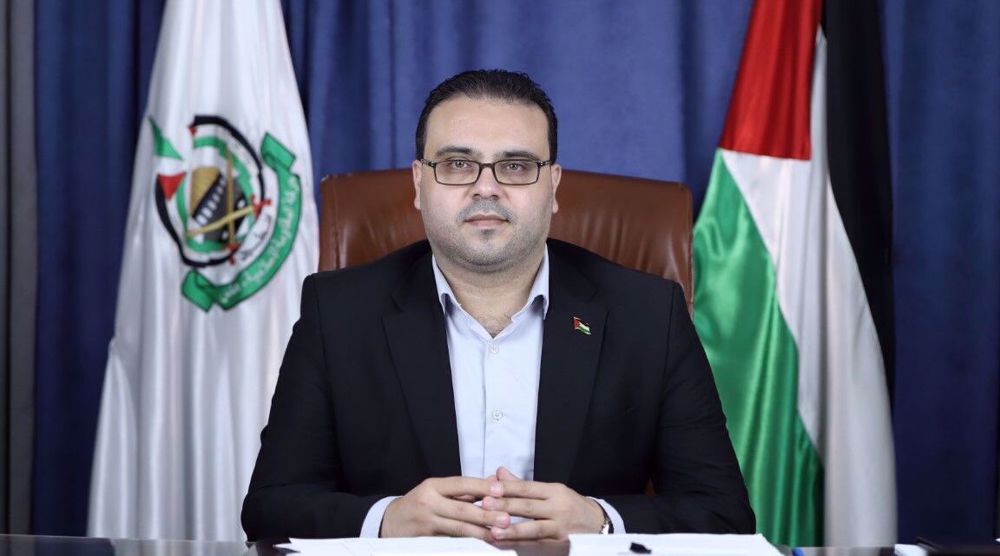Qatari Emir: Israel major source of tensions in region
The Emir of Qatar calls Israel the major source of tensions in West Asia, saying instability will persist in the region unless the occupying regime stops violating international law.
Sheikh Tamim bin Hamad Al Thani made the comment in an address to a US-Arab summit in the Saudi city of Jeddah on Saturday, during which regional and international developments were discussed as well as aspects of expanding cooperation between the participating countries.
Al Thani said the Israeli settlement constructions, the regime’s attempts to change the demography of al-Quds and its blockade of the Gaza Strip are the root causes of instability and tension.
“The major sources of tension and instability in the region are here to stay unless Israel stops its practices and violations of international law, including building colonial settlements, changing the character of al-Quds and the continued blockade of Gaza,” the Qatari Emir said.
Al Thani also called for the need to find a just solution to the Palestine issue, adding that the matter is a central cause for the Arab and Muslim people.
The summit was attended by US President Joe Biden and the leaders of the Persian Gulf Cooperation Council (GCC) countries, Egypt, Iraq and Jordan.
Between 600,000 and 750,000 Israelis occupy over 250 illegal settlements built since the 1967 occupation of the Palestinian territories of the West Bank and East al-Quds.
Palestinians want the West Bank as part of a future independent Palestinian state, with East al-Quds as its capital.
The presence and continued expansion of illegal Israeli settlements in occupied Palestine, however, have created a major obstacle to the establishment of such a state.
The last round of Israeli-Palestinian talks collapsed in 2014, with Israel’s continued settlement expansion emerging as a key sticking point.
All Israeli settlements are deemed illegal under international law as they are built on the occupied land. The UN and most countries regard the Israeli settlements as illegal because the territories they are built on were captured by Israel in a war in 1967 and are hence subject to the Geneva Conventions, which forbid construction on occupied lands.
The UN Security Council has time and again condemned the occupying regime’s diabolic settler-colonialism project in its umpteen resolutions.
Israeli carriers pushing Saudis to permit overflights this week
Israel’s Channel 13 said on Sunday that the regime’s airlines are requesting to use Saudi Arabia’s skies for their flights as soon as this week, after Riyadh said it would allow them to fly over its territory.
The news network said El Al and Arkia were both asking to reroute flights scheduled this week to destinations in the Far East, which would shorten flight times by up to three hours.
Saudi Arabia announced on Friday that it was lifting restrictions on “all carriers” using its airspace, in an apparent gesture of openness toward Israel following Biden’s pledge to aggressively push for the normalization of relations between Riyadh and Tel Aviv.
The Saudi General Authority of Civil Aviation (GACA) said in a statement on its Twitter page that the country’s airspace was now open to all carriers that meet its requirements for overflights, in line with international conventions that say there should be no discrimination between civil aircraft.
The decision was made “to complement the kingdom’s efforts aimed at consolidating its position as a global hub connecting three continents,” the statement added.
In late 2020, the United Arab Emirates, Bahrain, Sudan, and Morocco became the first Arab countries in decades to normalize relations with Israel in a deal brokered by former US president Donald Trump. Saudi Arabia tacitly supported the deals, also called the Abraham Accords, but it did not openly normalize ties with Israel partly due to domestic considerations.
However, the kingdom is expected to jump on the bandwagon as the two sides broaden their interactions, despite Riyadh’s claims that it is committed to the 2002 so-called Arab Peace Initiative, which conditions normalizing ties with Israel on the establishment of an independent, sovereign Palestinian state within the 1967 borders.
In November 2020, Riyadh granted permission to Israeli airlines to use its airspace, hours before the first Israeli flight to the UAE was set to take off.
Palestinian leaders, activists, and ordinary people have repeatedly rejected Arab-Israeli normalization deals as “a stab in the back of the Palestinian cause and the Palestinian people.”
VIDEO | Press TV's news headlines
Hamas: Israel escalating ceasefire violations in Gaza
Venezuela's government declares unwavering unity behind Maduro
VIDEO | Global outcry over Venezuela president abduction
Iran keeps wheat import subsidies despite cutting other food supports
Venezuelan military stands with acting president after US kidnapping of Maduro
VIDEO | Press TV's news headlines
VIDEO | Protesters in Toronto slam US kidnapping of Venezuelan president










 This makes it easy to access the Press TV website
This makes it easy to access the Press TV website